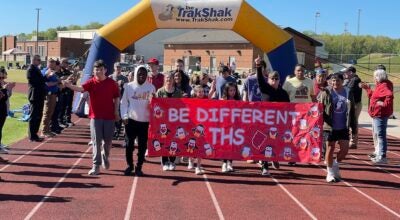AWC in need of volunteers
Published 5:00 pm Thursday, November 1, 2012

Alabama Wildlife Center Education and Outreach Director Jay Eubanks speaks during a Nov. 1 Alabaster-Pelham Rotary Club luncheon at Shelby Baptist Medical Center. (Reporter Photo/Neal Wagner)
By NEAL WAGNER / City Editor
The Alabama Wildlife Center is always looking for volunteers to do everything from greeting visitors to feeding baby birds, an AWC employee told the Alabaster-Pelham Rotary Club during a Nov. 1 lunch.
During the lunch, AWC Education and Outreach Director Jay Eubanks said the center only has five full-time employees, and relies heavily on its network of volunteers to care for the dozens of birds the center rehabilitates each month.
Eubanks said volunteers do not have to come into direct contact with the birds if they don’t want to, and said the center always needs volunteers to help with clerical duties, perform construction and maintenance tasks and help with the center’s educational programs.
For those who would like to work with the animals, the center’s bird rehabilitation center offers plenty of chances to help, Eubanks said.
“By far the most time-consuming operation is feeding the baby birds,” Eubanks said. “We take in 2,000 birds a year.”
The AWC has been operating at Oak Mountain State Park in a former restaurant building since 1987, and uses several facilities at the park to rehabilitate birds of all sizes.
“Before it opened in the state park, it was being operated out of volunteers’ houses,” Eubanks said.
In addition to its small bird rehabilitation center, the AWC also has a “free flight” area and a raptor flight building large enough to help birds of prey hone their hunting skills before they are released into the wild.
The center also works with the state park to operate the treetop nature trail, which features six flight cages containing birds not eligible for re-release into the wild.
Eubanks said the center has received more than 100,000 calls on its helpline over the past 30 years, and often works with callers to handle injured or abandoned birds. He said many people believe a parent bird will not care for its baby if a human handles it.
“That is not true,” Eubanks said. “Birds generally have poor senses of smell. Usually, a parent will not return because a human is standing next to the nest.”









